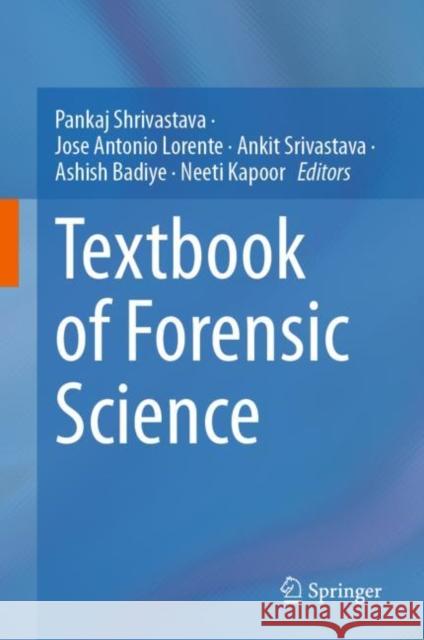Textbook of Forensic Science » książka



Textbook of Forensic Science
ISBN-13: 9789819913763 / Twarda / 2023 / 773 str.
Kindly refer to the attachment
Dr. Pankaj Shrivastava received his Ph.D. in Microbiology with a specialization in Biotechnology from the Department of Biological Science, Rani Durgawati University, Jabalpur, Madhya Pradesh, India. He is in-charge of the Forensic DNA Fingerprinting facility of Govt. of Madhya Pradesh, India. His research interests include population DNA database, improvement of methods in forensic DNA typing, finding rapid protocols for the technology, and microbial forensics. He is the recipient of the prestigious Pt. Govind Vallabh Pant Award from the Bureau of Police Research and Development, Ministry of Home Affairs, Govt. of India and Anusrajan Award from AIISECT University, Bhopal for his authored books. He is also a recipient of the FICCI smart Policing award for developing a fast DNA typing protocol. He has authored 13 books and published more than 60 research articles in the journals of repute in forensic science, 36 book chapters, 84 conference proceedings, and 15 popular science articles.
Prof José Antonio Lorente is a Professor of Forensic Medicine at the University of Granada, Spain. After graduating at the Faculty of Medicine of Granada, he received Ph.D. Honors in Medicine and Surgery at the University of Granada. Dr. Lorente has published over 140 peer-reviewed papers and several books and book chapters. He has a special focus on the use of DNA and its application to human rights; he also created and launched the DNA-PROKIDS Program in 2004. His areas of interest in forensics also deal with population variability and analysis of old and ancient DNA samples and databases expansion and control. Dr. Lorente is also actively working in medical genomics and he's the scientific director of the Center for Genomics and Oncological Research (GENYO), where his team focuses on liquid biopsy and cancer interception. Dr. Lorente is the founder and first president of the AICEF (Ibero-Latin American Network of Forensic Sciences), and an honorary member of the AFSN (Asian Forensic Sciences Network).
Dr. Ankit Srivastava is an Assistant Professor at Dr. A.P.J. Abdul Kalam Institute of Forensic Science & Criminology, Bundelkhand University, Jhansi, Uttar Pradesh, India. He received Ph.D. in the field of Forensic Science from Bundelkhand University, Jhansi, Uttar Pradesh, India. During his 14 years of journey in teaching and research, he has authored several research articles in several journals of national and international repute. Forensic DNA Typing, Forensic Ballistics, Forensic Biology & Serology, Forensic Chemistry and Forensic Anthropology are the area of his research interest. Dr. Srivastava is associated with different universities as a Member of Board of Studies as well as examiner panel. He is a fellow of the prestigious American Academy of Forensic Science and International Society for Forensic Genetics.
Dr. Ashish Badiye is presently the Head of the Department and Assistant Professor at the Department of Forensic Science, Government Institute of Forensic Science, Nagpur, Maharashtra, India. He has completed his B.Sc. (Honors)& M.Sc. Forensic Science from Amity University, Noida, India. He has published over 40 research articles in journals of high repute and book chapters. He has received “the Young Scientist Award” (2018) at a National Conference jointly co-organized by the State Forensic Science Laboratory, Madhya Pradesh, Indian Science Congress Association Sagar Chapter and BTIE, Sagar. He has been awarded with the “Special Recognition Awards” for three years for his services in “Scientific Aid to Investigation” to the Maharashtra Police.
Dr. Neeti Kapoor is presently working as an Assistant Professor at the Department of Forensic Science, Government Institute of Forensic Science, Nagpur, Maharashtra, India. She completed her Master’s degree in Forensic Science as well as Bachelor’s degree in Forensic Science & Criminology from Dr. Hari Singh Gour University, Sagar, Madhya Pradesh, India. She has published more than 50 research articles and 10 book chapters. She has delivered over several invited talks and practical demonstrations at various educational institutions and to the police officers on various topics including Forensic Dermatoglyphics, Crime Scene Investigation, Physical evidences, Forensic Chemistry & Toxicology, Narcotic Drugs & Psychotropic Substances, etc.
This textbook provides essential and fundamental information to modern forensics investigations. It discusses criminalistics and crime scene aspects, including investigation, management, collecting and packaging various types of physical evidence, forwarding, and chain of custody. It presents fundamental principles, ethics, challenges and criticism of forensic sciences and reviews the crime typologies, the correlates of crime, criminology, penology, and victimology. It provides a viewpoint on legal aspects, including types of evidence, the procedure in the court and scrutiny of the evidence and experts.
The book summarizes forensic serological evidences such as blood, semen, saliva, milk-tears, sweat, vaginal fluids, urine, and sweat. It also provides an overview of forensic examination of different types of evidence and also includes comprehensive detailing of forensic ballistics including firearm classification, bullet comparison and matching. Further, it explores the examinations of drugs, chemicals, explosives, and petroleum products. It focuses on the various aspects of forensic toxicology, including the study of various poisons/toxins, associated signs and symptoms, a fatal dose /fatal period of poisons.
The book also emphasizes digital and cyber forensics, including classification, data recovery tools, encryption and decryption methods, image, and video forensics.
It is a useful resource for graduate and post-graduate students in the field of Forensic Science.
1997-2026 DolnySlask.com Agencja Internetowa
KrainaKsiazek.PL - Księgarnia Internetowa









